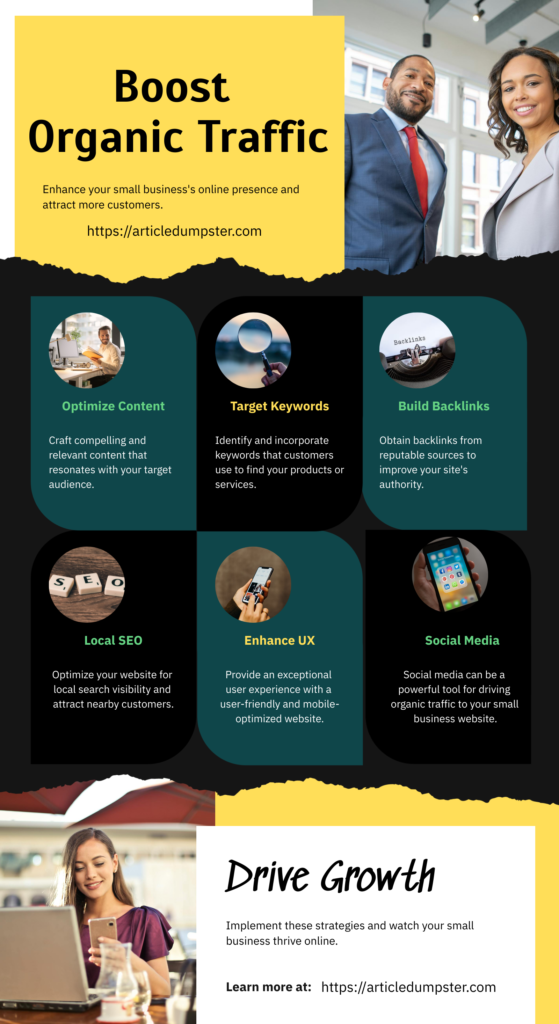For small businesses, driving organic traffic to their website can be a game-changer. Organic traffic refers to visitors who find your site through unpaid search engine results, making it a highly valuable source of potential customers. However, achieving consistent organic traffic growth can be a challenge, especially for small businesses with limited resources.
Unlike paid advertising, organic traffic relies on optimizing your website and content to rank higher in search engine results pages (SERPs). This requires a strategic approach that combines technical SEO, content creation, link building, and other tactics. While it may take time and effort, the long-term benefits of organic traffic can be significant, including increased brand awareness, higher conversion rates, and a better return on investment.
In this blog post, we’ll explore proven strategies to help small businesses boost their organic traffic and gain a competitive edge in their respective industries.
Conduct Keyword Research for Small Businesses
The foundation of any successful SEO strategy is keyword research. Keywords are the words or phrases that potential customers type into search engines when looking for products, services, or information related to your business. By identifying and targeting the right keywords, you can improve your website’s visibility in relevant search results.
For small businesses, it’s crucial to focus on long-tail keywords, which are more specific and less competitive than broad, generic keywords. Long-tail keywords often have lower search volumes but higher intent, meaning the people searching for them are more likely to be interested in what you offer.
To find relevant long-tail keywords for your small business, you can use tools like Google Keyword Planner, SEMrush, or Ahrefs. These tools provide valuable insights into search volumes, competition levels, and related keywords that you may have overlooked.
When conducting keyword research, consider your products or services, your target audience, and the language they use when searching. Don’t just rely on your assumptions; use the data from these tools to make informed decisions about which keywords to target.
Proper keyword research is essential for identifying terms that your target audience is actively searching for. When conducting keyword research for your small business, consider leveraging a variety of data sources and tools.
Here’s an overview of some useful keyword research tactics and metrics to guide your efforts:
| Keyword Research Tactic | Key Metrics to Consider |
| Google Keyword Planner | Monthly search volume, competition level, suggested keyword ideas |
| Competitor Research | Competitors’ ranking keywords, keyword gaps to exploit |
| Online Forums & Communities | Frequently discussed topics, questions, and phrases |
| Customer Reviews & Surveys | Common language used to describe your products/services |
| Google Search Console | Your current ranking keywords, average position, click-through rates |
| Keyword Research Tools (Ahrefs, SEMrush, etc.) | Keyword difficulty scores, cost-per-click estimates, search intent insights |
Optimize Website for Target Keywords
Once you’ve identified your target keywords, the next step is to optimize your website to rank well for those terms. This process, known as on-page optimization, involves strategically incorporating your keywords into various elements of your website’s content and structure.
Start with your website’s titles and meta descriptions, as these are among the first things users see in search results. Craft compelling, keyword-rich titles and meta descriptions that accurately reflect the content on each page and entice users to click through to your site.
Next, optimize your website’s content itself. This includes blog posts, product descriptions, and any other text-based content on your site. Incorporate your target keywords naturally throughout the copy, focusing on providing value and a great user experience rather than just stuffing keywords.
Don’t forget to optimize your images and multimedia as well. Use descriptive file names and alt text that include relevant keywords, making your content more accessible and search engine-friendly.
By optimizing your website for your target keywords, you’ll increase the chances of ranking higher in search results for those terms, driving more organic traffic to your small business.
Build Quality Backlinks
While optimizing your website’s content and structure is crucial, it’s only one piece of the organic traffic puzzle. Search engines also place a significant emphasis on backlinks – links from other websites pointing to your site.
Backlinks act as votes of confidence and can significantly impact your website’s authority and search engine rankings. The more high-quality backlinks you have from reputable, relevant sources, the more likely you are to rank well for your target keywords.
For small businesses, building a strong backlink profile can be a challenge, but there are several effective strategies you can employ:
- Guest Posting: Reach out to industry-related blogs or websites and offer to contribute high-quality, original content in exchange for a backlink. This allows you to tap into new audiences while simultaneously boosting your backlink portfolio.
- Broken Link Building: Identify broken links on authoritative websites within your industry and suggest replacement links to your relevant content. If the website owners update the broken links with your suggestions, you’ll earn valuable backlinks.
- Local Citation Building: If your small business serves a specific geographic area, focus on building citations (listings) on local directories, review sites, and other relevant platforms. These citations often include backlinks, helping to improve your local search visibility.
When building backlinks, quality should always be prioritized over quantity. A few well-placed, relevant backlinks from trusted sources will be far more valuable than a large number of low-quality, spammy links.
Leverage Social Media for Small Business Organic Traffic
Social media can be a powerful tool for driving organic traffic to your small business website. While social signals (likes, shares, comments) may not directly impact search engine rankings, they can indirectly influence your visibility and discoverability.
Start by identifying the social media platforms where your target audience is most active. For many small businesses, platforms like Facebook, Instagram, and Twitter may be the most relevant. However, don’t discount the potential of niche platforms, depending on your industry and audience.
Once you’ve established a presence on the appropriate platforms, focus on creating and sharing high-quality, engaging content. This could include blog posts, infographics, videos, or even live streams. Encourage your followers to interact with and share your content, as increased engagement can lead to greater visibility and more opportunities for organic traffic.
Additionally, use social media as a way to connect with influencers and industry leaders in your space. Collaborating with influencers or being featured on their platforms can expose your brand to new audiences and drive more traffic to your website.
Remember, social media is a two-way conversation. Don’t just broadcast your content; engage with your followers, respond to comments and questions, and participate in relevant discussions. This level of engagement can help strengthen your brand’s presence and credibility, ultimately leading to more organic traffic opportunities.
Focus on Local SEO for Small Businesses
If your small business serves a specific geographic area, it’s essential to optimize your online presence for local search. Local SEO helps ensure that your business appears prominently in relevant local search results, making it easier for nearby customers to find you.
One of the most crucial aspects of local SEO is claiming and optimizing your Google My Business listing. This free listing allows you to provide detailed information about your business, including your address, phone number, business hours, and even photos and videos.
Ensure that your Google My Business listing is complete, accurate, and optimized with relevant keywords and categories. Encourage satisfied customers to leave reviews on your listing, as positive reviews can significantly impact your local search visibility.
In addition to your Google My Business listing, focus on building citations (consistent listings) on other local directories and review sites, such as Yelp, Yellowpages, and industry-specific platforms. These citations help reinforce your business’s online presence and can include backlinks, further boosting your local SEO efforts.
For businesses with multiple locations, it’s crucial to optimize each individual location’s listings and create location-specific content on your website. This can help you rank more effectively in local search results for each area you serve.
By implementing a comprehensive local SEO strategy, you’ll increase your chances of appearing prominently in relevant local search results, driving more organic traffic from nearby potential customers.

Track and Analyze Organic Traffic
As you implement various strategies to boost your small business’s organic traffic, it’s essential to track and analyze your progress. Without proper tracking and analysis, you’ll be operating blindly, unable to identify what’s working and what needs improvement.
Google Analytics is a free, powerful tool that should be your go-to for tracking and analyzing your website’s traffic. With Google Analytics, you can gain insights into your traffic sources, user behavior, conversion rates, and much more.
Start by setting up Google Analytics and integrating it with your website. Then, familiarize yourself with the platform’s various reports and metrics, such as:
- Acquisition Reports: These reports provide detailed information on your traffic sources, including organic search, referrals, social media, and more. Use these reports to identify your top organic traffic sources and the keywords driving that traffic.
- Behavior Reports: Understand how users interact with your website, including the pages they visit, their navigation paths, and their engagement metrics (bounce rate, time on site, etc.). This information can help you optimize your content and user experience for better organic traffic engagement.
- Conversion Reports: If you have specific goals set up (e.g., form submissions, purchases, etc.), these reports will show you how your organic traffic is contributing to those conversions, allowing you to measure the true value of your organic efforts.
In addition to Google Analytics, consider setting up a Google Search Console account. This tool provides valuable insights into how your website is performing in Google’s search results, including your average position for specific keywords, any crawling or indexing issues, and more.
Regularly review your data, identify trends and opportunities, and use these insights to refine your organic traffic strategies continuously. Data-driven decision-making is key to achieving long-term success in driving organic traffic to your small business website.
Stay Up-to-Date with SEO Best Practices
Search engine optimization is a constantly evolving landscape. Search engines like Google frequently update their algorithms, prioritizing different ranking factors and adjusting their guidelines for what constitutes high-quality, user-friendly content.
To maintain and grow your organic traffic over time, it’s crucial to stay informed about the latest SEO best practices and trends. Subscribe to industry blogs and newsletters, attend webinars or conferences, and continually educate yourself on the latest developments in the world of SEO.
Some key areas to keep an eye on include:
- Mobile Optimization: With more and more users accessing the internet via mobile devices, search engines are placing a greater emphasis on mobile-friendly websites. Ensure your site is optimized for mobile, with fast load times, responsive design, and a seamless user experience.
- User Experience Signals: Search engines are increasingly prioritizing websites that offer an exceptional user experience. This includes factors like site speed, navigation structure, and engaging, interactive content.
- Voice Search Optimization: As voice assistants like Siri, Alexa, and Google Assistant become more prevalent, optimizing your content for voice search queries will become increasingly important.
- Artificial Intelligence and Machine Learning: Search engines are leveraging AI and machine learning to better understand user intent and deliver more relevant results. Keeping up with these advancements and adjusting your strategies accordingly will be crucial.
By staying up-to-date with the latest SEO best practices and trends, you’ll be better equipped to adapt your organic traffic strategies and maintain a competitive edge in the ever-changing search landscape.
Conclusion
Driving organic traffic to your small business website is a marathon, not a sprint. It requires a combination of strategic efforts, including keyword research, on-page optimization, link building, social media promotion, local SEO, and continuous analysis and adaptation.
While the process may seem daunting, the potential rewards of increased organic traffic are well worth the investment of time and resources. Organic traffic can lead to higher brand awareness, more qualified leads, and ultimately, increased revenue for your small business.
Remember, SEO is an ongoing process, and success doesn’t happen overnight. Consistency and patience are key. Commit to implementing the strategies outlined in this post, and don’t be afraid to experiment and adjust your approach as needed.
Start by conducting thorough keyword research to identify the terms your target audience is searching for. Then, optimize your website’s content, structure, and multimedia elements to rank well for those keywords. Build a diverse portfolio of high-quality backlinks from reputable sources, leveraging tactics like guest posting, broken link building, and local citation development.
Harness the power of social media to amplify your content, engage with your audience, and tap into new organic traffic streams. If you serve a local community, focus on optimizing your Google My Business listing and building a strong local SEO presence.
Throughout your journey, track and analyze your organic traffic data using tools like Google Analytics and Search Console. Use these insights to refine your strategies continuously and stay ahead of the curve as search engine algorithms and best practices evolve.
Don’t be discouraged if you don’t see immediate results. Organic traffic growth takes time and consistent effort, but the long-term benefits of increased visibility, brand awareness, and potential revenue make it a worthwhile investment for any small business.
By following the strategies outlined in this post and remaining committed to your organic traffic efforts, you’ll be well on your way to achieving sustainable growth and success in the competitive digital landscape.




